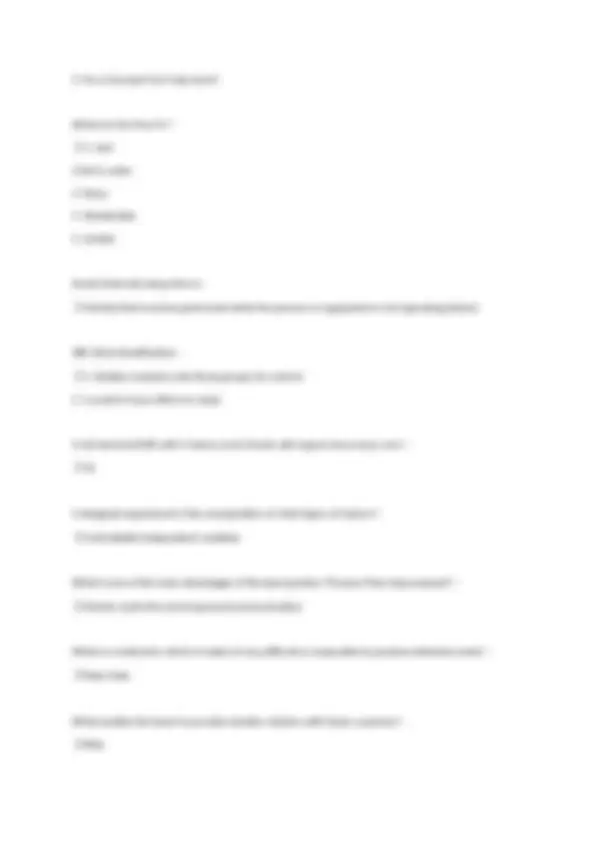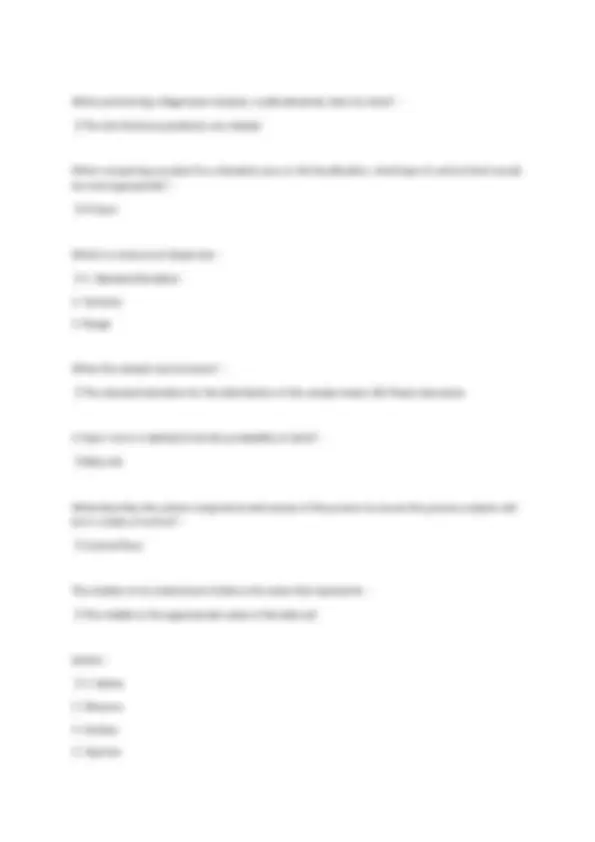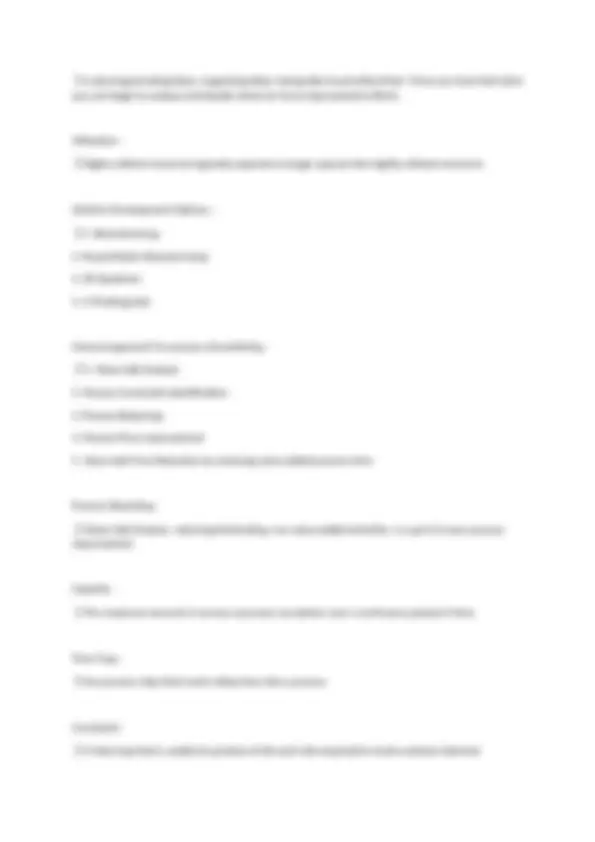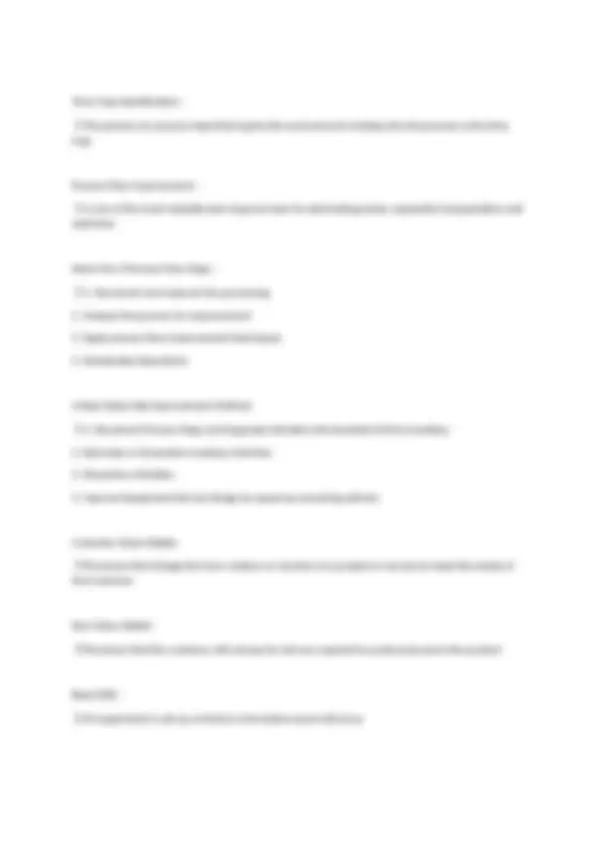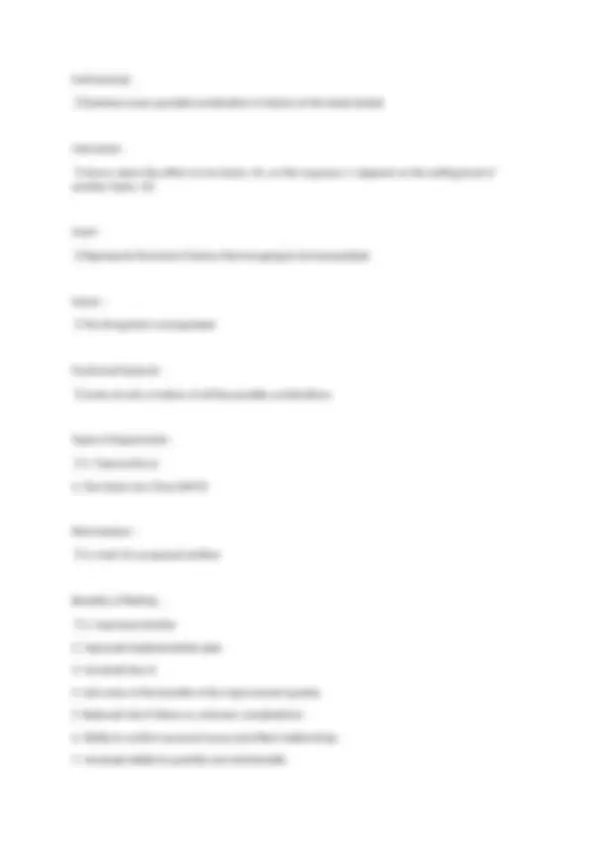Download Lean Six Sigma Study Guide Complete Overview with Tools, Concepts, and Practice Questions and more Exams Waste Management in PDF only on Docsity!
Lean Six Sigma Study Guide Complete Overview
with Tools, Concepts, and Practice Questions and
Answers
Special Cause variation is - ✅ is not random and changes over time 5%-15% of all variation The box on a Boxplot contains what % of the data? - ✅ 50% What is the elapsed time from completion of one type of task to beginning of work on another type of task? - ✅ Setup time Throughput is often defined as what? - ✅ Exit Rate What are the primarily form of the Voice of the Customer - ✅ Quality, Cost and Speed The SIPOC Chart - ✅ Helps to identify the customers, supplier and outputs Process/Value Stream Maps: - ✅ Are valuble for describing the current situation What basic tool would you most logically use to supplement brainstorming to prioritize ideas? - ✅ Nominal Group Technique
The control limits on a control chart are? - ✅ Boundaries that result from the process itself What type of Control Chart would be used to track defects? - ✅ C Charts What process capability ratio would you use to determine if the process performance potentially can fit within the range of the upper and lower specification limits (process centering is not an issue) - ✅ Cp A Cpk value less than zero indicates that most of the data points fall: - ✅ Outside the specification limits The Takt Rate can be described as? - ✅ Number of units to process divided by Net Process Time Available An example of a Type II error is: - ✅ I have missed a significant event The value of the Power of a test is: - ✅ One minus the beta level How do you describe the interpretation of the p-value in a statistical test? - ✅ 1. If we reject the null hypothesis, the p-value is the probability of being wrong
- If we reject the null hypothesis, the p-value is the probability of making a Type I error
- If we don't want alpha to be more than 0.05, then we simply accept the alternate hypothesis when the p-value is 0.05 or less
- For a focused 3 to 5 day event What are the Five S's? - ✅ 1. Sort 2.Set in order
- Shine
- Standardize
- Sustain Serial (Internal) setup time is - ✅ Activity that must be performed while the process or equipment is not operating (down) ABC Parts Stratification - ✅ 1. Divides inventory into three groups for control
- Is used to focus effort on value A full factorial DOE with 4 factors and 2 levels will require how many runs? - ✅ 16 A designed experiment is the manipulation of what types of factors? - ✅ Controllable independent variables What is one of the main advantages of the best practice "Process Flow Improvement" - ✅ Shorter cycle time and improved communication What is a method in which it makes it very difficult or impossible to produce defective work? - ✅ Poka Yoke What enables the team to provide a better solution with fewer surprises? - ✅ Pilot
When performing a Regression Analysis, multicolinearity refers to what? - ✅ The fact that two predictors are related When comparing a product to a standard, pass or fail classification, what type of control chart would be most appropriate? - ✅ P Chart What is a measure of dispersion - ✅ 1. Standard Deviation
- Variance
- Range When the sample size increases? - ✅ The standard deviation for the distribution of the sample means (SE Mean) decreases A Type II error is defined to be the probability of what? - ✅ Beta risk What describes the actions required at each phase of the process to assure the process outputs will be in a state of control? - ✅ Control Plans The median of an ordered set of data is the value that represents: - ✅ The middle or the approximate value of the data set DMAIC - ✅ 1. Define
- Measure
- Aanlyze
- Improve
- Total Process Capability - ✅ Quantifiable comparison of Voice of Customer (customer requirements or spec limits) to Voice of the Process (process performance - control limits) Process Capability Formula Cpk - ✅ Cpk = Min (USL/3-x or x-LSL/3) Typical goals for Cp are greater than - ✅ 1.33 (1.67 for safety items) Project Management Tools - ✅ 1. Project Charter
- communication plan
- stakeholder analysis
- Multi-Generation Project Plan
- Risk Assessment matrix
- Issue Log Effective Meetings - ✅ 1. Useful
- Timely
- Key essential personnel
- Inform in advance
- Open with positives
- Summarize at the end Communication Planning - ✅ 1. Effective communicator
- Know the best way to communicate with the team
- Key stakeholders
- Project sponsors Five stages of team development - ✅ 1. Forming
- Storming
- Norming
- Performing
- Adjourning Black Belt Roles and Responsibilities - ✅ Lead LSS projects within your command and effectively coordinating these projects with the command's deployment director Project leadership includes - ✅ 1. Identifying opportunities for change
- Defining and financially justifying projects
- Launch project teams
- Use good project management to manage team activities
- Lead team to execute projects with the problem solving methodology
- Track project status and results
- Remove and elevate project barriers
- Develop team members Team Launch Goals - ✅ To create a high performing team by helping team members quickly agree on how they can be most effective and successful Team Launch does what? - ✅ 1. Reach and understanding of project objectives
- Establish performance objectives/goals
- Customer satisfaction
- Error rate The process for Identifying Opportunities and Selecting Lean Six Sigma projects - ✅ 1. Identify Value Levers
- Identify Project Opportunities
- Screen Initial List of Opportunities
- Scope and Define Projects
- Prioritize List of Defined Projects Project Charter Elements - ✅ 1. Business Impact
- Opportunity or Problem Statement
- Goal Statement
- Project Scope
- Project Plan
- Team Selection What is a SIPOC? - ✅ 1. Suppliers
- Inputs
- Process
- Outputs
- Customer A SIPOC Chart helps to do what? - ✅ Identify the process outputs and the customers of that output so that the Voice of the Customer can be captured. What are the 7 Dealy Wastes? - ✅ 1. Transportation
- Inventory
- Motion
- Waiting
- Overproduction
- Overprocessing
- Defect/Rework What is the Process Lead Time? - ✅ The total time to complete an activity or process Little's law (Process Lead Time) = - ✅ WIP/Exit Rate Work In Process (WIP) - ✅ Product that is within the boundaries of the process Exit Rate (Through put) - ✅ The output of a process over a defined period of time Process Cycle Efficiency - ✅ A measure of the relative efficiency in a process - the percentage of value add time of a product down the critical path PCE = - ✅ Customer Value Add/Process Lead Time Process/Service Design Requirements come from - ✅ 1. Customers (VOC)
- Business (VOB)
- Stakeholders
- Regulations
✅ Is about generating ideas, organizing ideas, being able to prioritize them. Once you have that done you can begin to analyze and decide where to focus improvement efforts. Utilization - ✅ Highly utilized resources typically experience longer queues than lightly utilized resources Solution Development Options - ✅ 1. Brainstorming
- Round-Robin Brainstorming
- 20 Questions
- 6 Thinking hats General approach for process streamlining - ✅ 1. Value Add Analysis
- Process Constraint Identification
- Process Balancing
- Process Flow Improvement
- Value Add Time Reduction by reducing value added process time Process Steamling - ✅ Value-Add Analysis, reducing/eliminating, non value added activities, is a part of every process improvement Capacity - ✅ The maximum amount of service a process can deliver over a continuous period of time Time Trap - ✅ Any process step that inserts delay time into a process Constraint - ✅ A time trap that is unable to produce at the exit rate required to meet customer demand
Time Trap Identification - ✅ The process (or process step) that injects the most amount of delay into the process is the time trap Process Flow Improvement - ✅ Is one of the most valuable lean improve tools for eliminating waste, especially transportation and wait time Name the 4 Process Flow Steps - ✅ 1. Document and measure the processing
- Analyze the process for improvement
- Apply process flow improvement techniques
- Standardize Operations 4 Step Value Add Improvement Method - ✅ 1. Document Process Steps and Separate Activities into Essential (CVA) & Auxiliary
- Eliminate or Streamline Auxiliary Activities
- Streamline Activities
- Improve Equipment/Service Design to speed up remaining activies Customer Value Added - ✅ Processes that change the form, feature or function of a product or service to meet the needs of the Customer Non Value Added - ✅ Processes that the customer will not pay for but are required to produce/process the product Basic DOE - ✅ An experiment is set up so that an informative event will occur
Risk Assessment - ✅ The chance of loss or the perils to loss; also the degree of probability of loss Risk Management is a comprehensive means to proactively - ✅ 1. identify
- Assess
- Mitigate Process Controls Reaction Types - ✅ 1. Compensate
- Correct
- Prevent CNX Variables of Cause and Effect - ✅ 1. C (Controllable)
- N (Noise)
- X A variable we may have experimented with already For Standard Operating Procedures (SOPs) focus on what? - ✅ C Controllable variables Mistake proofing - ✅ Is a mechanism that prevents errors from being made, or makes the mistakes obvious at a glance What are the two detection system in mistake proofing - ✅ 1. Control/warning approach
- Prevention approach What is a Poka-Yoke device? -
✅ It's any mechanism that either prevents a mistake from being made or makes the mistake obvious at a glance What is the Mistake proofing 4 step method - ✅ 1. Identify/describe the defect
- Analyzze the process where the defect is made
- Determine the root cause of the defect and brainstorm improvement
- Implement mistake proofing techniques


